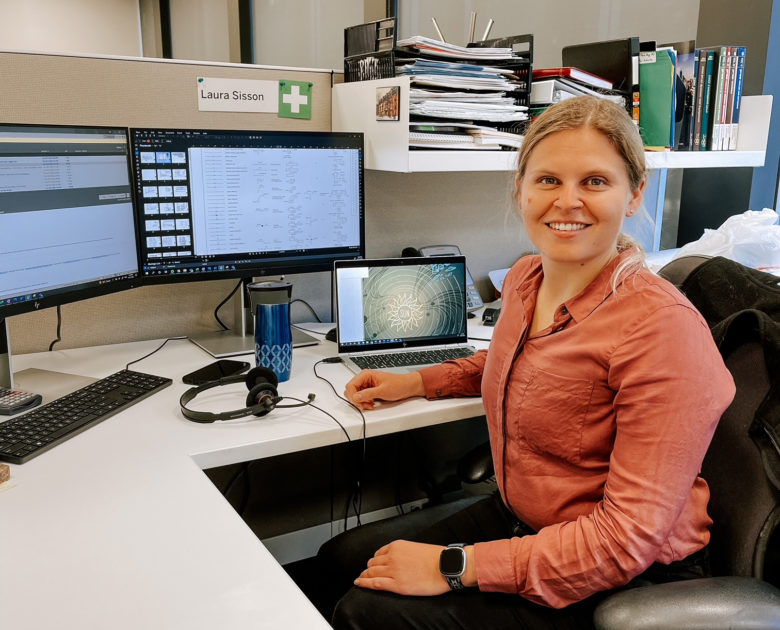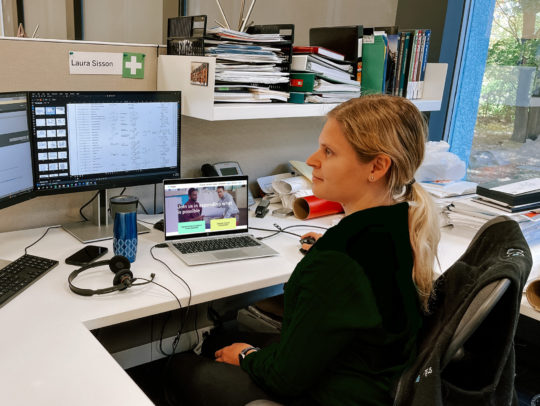Meet Laura Sisson – Manager, Mechanical Engineer, Health Division

Laura Sisson joined HH Angus in 2011.
Why did you choose to study engineering at university?
I always liked math and physics growing up, and those skills seemed like a good fit with engineering. I think mechanical engineering attracted me in particular because it seemed like it would provide a lot of career options, and many of them were very practical roles. I’ve always cared about the environment, and mechanical engineering seemed to be an option that would open many paths and allow me to work on environmental challenges in different ways.
What interested you about HH Angus when you applied to work here?
The thing that drew me to HH Angus was the different divisions and how technically deep each division is. I felt that the engineering experience I could get here was vast and I found that appealing.
What are some of the things you like about working at HH Angus?
I like the people. We have a really good culture here, and everybody is always willing to drop whatever they're doing and give a lending hand or some advice or point you in the right direction. I've never felt that I'm bothering someone or wasting someone's time by asking questions. That's quite special and unique. There isn’t any sense of competition, but more of a sense of community. I also like the sheer amount of knowledge that’s still here – people who’ve been here for 20, 30, 40 years and who know everything about their subject matter and who are also friendly and approachable. I know that if I run into a challenge, there’s always someone I can ask and, if they can’t solve it, there’s someone they can ask.

You’ve taken an active role in HH Angus’ Sustainability Committee and LEED projects. How is that interest related to your work?
I am drawn to looking at some of the more innovative engineering designs. For example, we have a current project for which we’re investigating geothermal and looking at reducing natural gas consumption. That’s the sort of work that makes a real difference in terms of reducing fossil fuel energy consumption and would make ‘high school me’ proud for choosing this field.
How do you contribute to the design and construction of the built environment?
I manage people, but I also manage projects. My role involves coordinating with clients, architects, and contractors. Attending meetings, making sure I understand what the priorities are on a project, what design changes need to happen, what considerations we need to be making within the office. I then distribute that information internally to the responsible parties such as the design leads. The reverse also happens – receiving feedback about a concern or coordination item that needs to be addressed, and then making sure that gets passed on to the right people on the client side or to our fellow consultants on the job.
What are some projects to date that you are proud of having been involved in?
Definitely CHUM (Editor: Centre hospitalier de l’Université de Montréal, one of the largest healthcare P3 projects in North America). It was a beast of a project, and a very long schedule – seven years. Those of us who worked on it got to know each other very well, and I think that was special. You don't always get the opportunity to work with so many people for such a long time on the same project. I look back on it now and think, “wow, that was quite the feat”. I also really enjoyed my involvement in the Penticton Regional Hospital. I worked on both the pursuit and the design and construction of Phase 1, and I was lead mechanical engineer on the Phase 2 portion, which involved the renovation in the existing hospital. It was one of the first and biggest projects I stamped, so that was impactful. To make it even more special, I have family in that area, so it was kind of neat to know that I had impacted this place that's going to be important to them.
How has working at HH Angus helped you broaden and grow your career?
When I look back on CHUM, which was the first project I worked on, I had different roles throughout the project. There were times I was doing ventilation design, and at other points I was doing construction management. So, it felt that, even though I was on one project, I was able to take on different roles. I had a concern early on that maybe I'd be pigeonholed on one thing, because that was the only project I worked on for such a long time, but this was not the case. There was deliberate action taken to round out my experience and expose me to different types of roles and projects. I felt there was a holistic view taken on my career development. Over the years, I've taken on more responsibility, bigger projects, and dealt with more staff on those projects, and that ultimately led me to the role of manager.
What is one of the most important things you've learned on the job?
Always document everything in an e-mail or memo, things like project decisions and why we took certain steps, so we don't have to go back and question those decisions later. Sometimes a client may question an element of the design, so we have to be able to explain why it was done; for example, did another member of client team make a request for a particular aspect of the design? Documenting choices and actions helps to substantiate decisions.
What are some of the trends or new technologies that you find interesting right now?
I’d say the move away from natural gas and looking at electrification alternatives. Even though heat pump technology isn't brand new, the application of it hasn't been as common in healthcare and we're starting to look at it more. We still have the same components, piping and pumps, etc. But we're looking at things a little bit differently and looking at how to assemble those components to create a different system and adjusting how we heat the building to make sure that it can operate well on lower temperature hot water. It's just a little bit of a tweak in in approach, but it's an interesting shift.
On a personal level. Is there anything that people would be surprised to learn about you?
I'm an avid curler, I think a lot of people in the office know that because of the Angus curling events. But maybe something more surprising would be that I grew up on a beef farm which my aunt now operates. I enjoy going back and spending weekends there. Also, I'm a lover of all genres of music, so you can often find me at a concert.
